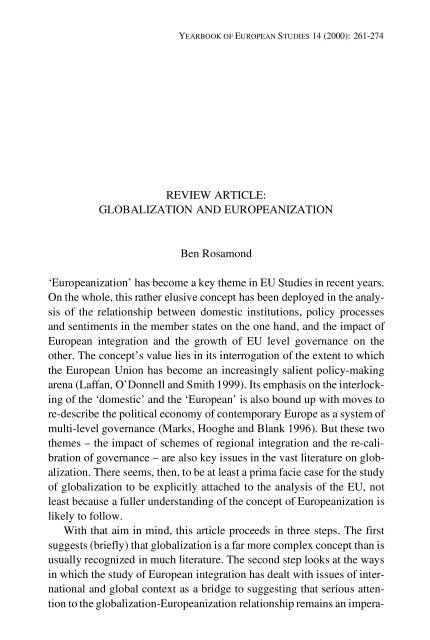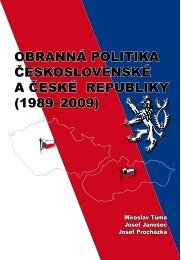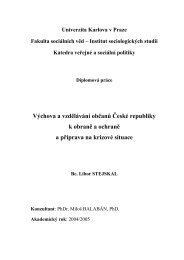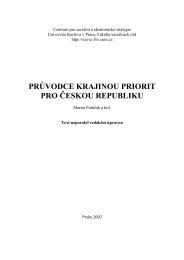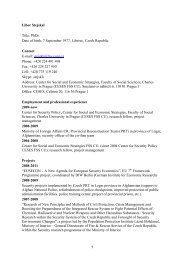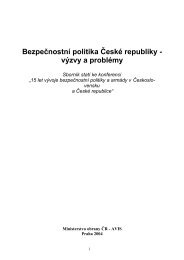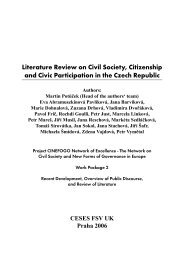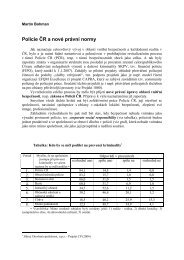Review Article: Globalization and Europeanization
Review Article: Globalization and Europeanization
Review Article: Globalization and Europeanization
Create successful ePaper yourself
Turn your PDF publications into a flip-book with our unique Google optimized e-Paper software.
YEARBOOK OF EUROPEAN STUDIES 14 (2000): 261-274<br />
REVIEW ARTICLE:<br />
GLOBALIZATION AND EUROPEANIZATION<br />
Ben Rosamond<br />
‘<strong>Europeanization</strong>’ has become a key theme in EU Studies in recent years.<br />
On the whole, this rather elusive concept has been deployed in the analysis<br />
of the relationship between domestic institutions, policy processes<br />
<strong>and</strong> sentiments in the member states on the one h<strong>and</strong>, <strong>and</strong> the impact of<br />
European integration <strong>and</strong> the growth of EU level governance on the<br />
other. The concept’s value lies in its interrogation of the extent to which<br />
the European Union has become an increasingly salient policy-making<br />
arena (Laffan, O’Donnell <strong>and</strong> Smith 1999). Its emphasis on the interlocking<br />
of the ‘domestic’ <strong>and</strong> the ‘European’ is also bound up with moves to<br />
re-describe the political economy of contemporary Europe as a system of<br />
multi-level governance (Marks, Hooghe <strong>and</strong> Blank 1996). But these two<br />
themes – the impact of schemes of regional integration <strong>and</strong> the re-calibration<br />
of governance – are also key issues in the vast literature on globalization.<br />
There seems, then, to be at least a prima facie case for the study<br />
of globalization to be explicitly attached to the analysis of the EU, not<br />
least because a fuller underst<strong>and</strong>ing of the concept of <strong>Europeanization</strong> is<br />
likely to follow.<br />
With that aim in mind, this article proceeds in three steps. The first<br />
suggests (briefly) that globalization is a far more complex concept than is<br />
usually recognized in much literature. The second step looks at the ways<br />
in which the study of European integration has dealt with issues of international<br />
<strong>and</strong> global context as a bridge to suggesting that serious attention<br />
to the globalization-<strong>Europeanization</strong> relationship remains an impera-
262 BEN ROSAMOND<br />
tive task for scholars of the EU. However, the third step – recalling the<br />
first – cautions against a simplistic underst<strong>and</strong>ing of the problem by<br />
laying out a number of potential approaches, providing a critical review<br />
of existing work on the political economy of globalization <strong>and</strong> imagining<br />
potentially useful conversations with current research on European integration.<br />
<strong>Globalization</strong><br />
‘<strong>Globalization</strong>’ is everywhere – or so we are told. The term is ubiquitous<br />
<strong>and</strong> signifies novelty, radical transformation, uncertainty, challenge <strong>and</strong><br />
much else. It is a staple, not just of academic discussion, but also of<br />
journalistic <strong>and</strong> policy-making discourses. <strong>Globalization</strong> has the impressive<br />
quality of a term that is widely understood, but poorly defined <strong>and</strong><br />
often hopelessly under-specified.<br />
The academic elasticity of the term may, of course, explain globalization’s<br />
success. It also seems clear that it is a concept that arose around<br />
the turn of the 1960s in the corporate <strong>and</strong> financial journalism communities<br />
(Waters 1995). Its academic debut is rather more recent (the 1980s)<br />
<strong>and</strong> was probably first found in sociological circles. In his recent book<br />
What is <strong>Globalization</strong>?, Ulrich Beck argues that the concept operates in<br />
several dimensions: communications technology, ecology, the economy,<br />
the organization of work, culture <strong>and</strong> civil society (Beck 2000; see also<br />
Held et al 1999). Yet, within each of these dimensions the concept remains<br />
elusive. In most public <strong>and</strong> academic argument, globalization is<br />
thought of as an economic phenomenon, identified most usually with<br />
heightened capital mobility, intensified international trade <strong>and</strong> the multi<strong>and</strong><br />
transnationalization of production. These changes occur within <strong>and</strong><br />
because of revolutions in communications <strong>and</strong> information technology.<br />
In these terms the primary consequences of globalization are (a) a transformation<br />
in the structures <strong>and</strong> practices of the world economy <strong>and</strong> (b) a<br />
dilemma for established forms of authority such as national governments.<br />
This could still mean a number of things such as the disarticulation of<br />
distinctively national economies, the creation of an information economy<br />
rooted in the financial calculus of genuinely transnational economic<br />
agents, the spread of a particular version of economic ideology (neoliberalism)<br />
or the heightened exposure of national economies to exogenous<br />
external pressures.
<strong>Review</strong> <strong>Article</strong> 263<br />
This point is crucial for two reasons. The first is that critics of the<br />
globalization thesis may actually be criticizing only a small element of<br />
the ensemble of phenomena that the term captures. Thus Paul Hirst <strong>and</strong><br />
Grahame Thompson’s seminal <strong>Globalization</strong> in Question (Hirst <strong>and</strong><br />
Thompson 1999) develops a counter-conception of an international economy<br />
with considerable space for national political agency out of a definition<br />
of globalization as the creation of a borderless global economy<br />
populated by powerful transnational corporate <strong>and</strong> financial actors. Others<br />
– drawing on the idea of globalization as external competitive <strong>and</strong><br />
financial threat – point out that governments have always faced these<br />
problems <strong>and</strong> that history shows the capacity of national executives to<br />
meet the challenge through adept statecraft (Thompson 1999). Another<br />
line of argument disputes the novelty of globalization, pointing either to<br />
the long-run existence of interdependence among economies or to earlier<br />
technologies (such as telegraphy) that removed the constraints of distance.<br />
In addition, the tendency to characterize globalization as a process<br />
has the effect of ‘exogenizing’ or removing an underst<strong>and</strong>ing of agency<br />
from the phenomenon (Germain 2000). The second reason is that policy<br />
actors themselves deploy the vocabulary of ‘globalization’, not least in<br />
the EU (Rosamond 1999). What politicians, technocrats <strong>and</strong> organized<br />
interests mean when they use the term is of vital interest precisely because<br />
particular definitions may have an impact upon both the diagnosis<br />
of policy problems <strong>and</strong> the creation of policy solutions.<br />
Linking these points together enables us to think about globalization<br />
in terms of structures <strong>and</strong> agents. Is it something ‘out there’ in the logic<br />
of impersonal markets or is it made by conscious human action? If the<br />
latter, is it a set of practices designed to further particular interests?<br />
Which actors – if any – retain authority or become authoritative in the<br />
context of globalization? Is the crucial measure of globalization objective<br />
or subjective; is a globalized world dependent on widespread consciousness<br />
of globalization’s existence? (Robertson 1992). If so what is the<br />
impact of these perceptions <strong>and</strong> how might these perceptions be moulded?<br />
If globalization – perceived or otherwise – does constitute a threat<br />
to national governance, what are the alternatives? Does globalization<br />
manifest itself in new institutional forms? Do these institutions act as<br />
sites of resistance or containment or do they actively facilitate globalization<br />
(whatever it is)? Set in this light, how <strong>and</strong> whether the growth of the
264 BEN ROSAMOND<br />
EU as (a) a project of regional integration <strong>and</strong> (b) a system of governance<br />
is related to globalization seems to be a pertinent question.<br />
European Integration in International/Global Context<br />
It is now more than a quarter of a century since Ernst Haas (1975) sounded<br />
the death knell of regional integration theory as a discrete pursuit in<br />
the political sciences. Haas, along with several of his erstwhile<br />
neofunctionalist colleagues, had come to the view that the analysis of<br />
regional entities such as the European Communities should be absorbed<br />
into the burgeoning study of interdependence (Webb 1983). The latter<br />
term was capable of capturing a range of dynamics that might help explain<br />
the tendency for adjacent economies to become enmeshed <strong>and</strong> for<br />
new forms of governance to follow. What was patently no longer possible<br />
was the generation of gr<strong>and</strong> theories of regionalism out of the<br />
specificities of the West European experience. With this in mind, one<br />
cardinal error of neofunctionalism had been its failure to explore the<br />
international context within which the growth of post-war European<br />
integration had occurred. ‘Interdependence’ became big business in the<br />
growing field of international political economy (IPE) that began to<br />
emerge through the 1970s. The neglect of international context also had<br />
been integral to longer-st<strong>and</strong>ing critiques of neofunctionalism, especially<br />
those of a state-centric persuasion. Stanley Hoffmann (1966) argued that<br />
member states’ diverse foreign policy alignments would be a powerful<br />
pull in the direction of the ‘logic of diversity’. Given the status of foreign<br />
policy as ‘high politics’ (i.e. matters where fundamental questions of<br />
sovereignty are at stake), the main impact of international context would<br />
be to check the ‘logic of integration’.<br />
It is worth remembering that neofunctionalists had begun to think<br />
about how to integrate the analysis of external context into their analysis<br />
of the Communities. Writers like Schmitter (1971) considered how geopolitical<br />
<strong>and</strong> geo-economic shocks could be used to explain either the<br />
initiation of regional integration schemes as well as the maintenance or<br />
reformulation of such institutional orders. Schmitter’s work <strong>and</strong> that of<br />
Haas (1975; 1976) was an exercise in thinking through how the incentive<br />
structures of actors – state <strong>and</strong> non-state – within the Communities<br />
would be re-ordered by exogenous happenings.
<strong>Review</strong> <strong>Article</strong> 265<br />
However, if anything, scholarship on the Communities became semidetached<br />
from the field of international studies. Writers like Donald<br />
Puchala (1972) <strong>and</strong> Leon Lindberg (1967) had pointed the way to the<br />
fruitful reconceptualization of the EC as a political system. They saw the<br />
Communities as novel, but nevertheless amenable to the tools of comparative<br />
political science <strong>and</strong> public policy analysis. Contemporary EU<br />
Studies has gone a long way to produce hugely valuable work out of this<br />
core insight. Indeed, there have been some powerful interventions suggesting<br />
that the study of EU politics has little to learn from the study of<br />
international relations (Hix 1994), while others have salvaged a role for<br />
IR in explaining international contextual factors (Peterson 1995; Hurrell<br />
<strong>and</strong> Menon 1996).<br />
The effects of the marginalization of IR in EU studies is another<br />
debate (Rosamond 2000: 157-185), but there is no doubt that the international<br />
studies community in general <strong>and</strong> international political economists<br />
in particular have become interested once again in questions of<br />
regional integration (Fawcett <strong>and</strong> Hurrell 1995; Gamble <strong>and</strong> Payne 1996;<br />
Hout <strong>and</strong> Grugel 1998; Mansfield <strong>and</strong> Milner 1997). The most obvious<br />
spur has been the growth of formal regional integration agreements in<br />
various parts of the world, <strong>and</strong> in this sense the EU (post Single European<br />
Act) is usually mentioned in the same intellectual breath as the likes<br />
of NAFTA, Mercusor <strong>and</strong> APEC. It is usual to underst<strong>and</strong> these regionalisms<br />
as related to international economic processes. The study of the EU<br />
is no exception, but the tendency in much of the literature is to make<br />
assertions about global economic change or the setting of competitive<br />
imperatives. What the EU studies literature continues to lack is a serious<br />
underst<strong>and</strong>ing of the ways in which globalization <strong>and</strong> its synonyms (‘informal<br />
economic integration’, ‘external competitive threat’, ‘the international<br />
economic context’, ‘interdependence’ <strong>and</strong> so on) actually operate<br />
within the context of EU policy-making <strong>and</strong> throughout the member<br />
states. The challenge is how to bring together our growing <strong>and</strong> sophisticated<br />
underst<strong>and</strong>ing of the complexities <strong>and</strong> variabilities of the EU multilevel<br />
polity with the study of global processes <strong>and</strong> interactions.
266 BEN ROSAMOND<br />
<strong>Globalization</strong>, European Integration <strong>and</strong> EU Governance<br />
Based upon a reading of existing literature, this section maps out a series<br />
of ways in which the relationship between globalization <strong>and</strong> the processes<br />
at work within the EU might be understood.<br />
Viewed through the lens of international economics <strong>and</strong> IPE, the EU<br />
is perceived as an instance of regionalism or regionalization. The former<br />
is usually defined as an institutional creation designed to augment the<br />
economic co-operation between groups of geographically adjacent states.<br />
The latter consists of the de facto emergence of regional economies<br />
resulting from the market <strong>and</strong> production activities of sets of private, i.e.<br />
non-state actors (Higgott 1997). Two questions tend to dominate this<br />
literature. The first considers the extent to which regional arrangements<br />
(particularly of the formal variety) enhance or retard the progress of<br />
global free trade. For some regional schemes – provided that they pursue<br />
a course of liberalization internally <strong>and</strong> a policy of ‘openness’ externally<br />
– constitute a stepping stone to globalism. In this incarnation, globalization<br />
becomes a process of world-wide liberalization that can be advanced<br />
or retarded by the actions of governments working in consort. Yet, the<br />
second question complicates matters somewhat. Here the issue is the<br />
exploration of the relationship between de jure regionalism <strong>and</strong> de facto<br />
regionalization. Crudely put, do states create the legislative space for<br />
private market actors to pursue integrative activities or do they engage in<br />
co-operation <strong>and</strong> agree to liberalize because of the power exerted by<br />
transnational economic actors. Aside from the resemblance of this debate<br />
to William Wallace’s well-established distinction between ‘formal’ <strong>and</strong><br />
‘informal’ integration (W. Wallace 1990), it also connects to issues about<br />
authority that lie at the heart of the globalization debate. The continuing<br />
salience (or otherwise) of the nation-state <strong>and</strong> the capacity of governmental<br />
elites to exercise executive autonomy is perhaps the most significant<br />
point of contention here. States may be the chief architects of globalization<br />
(or of the intermediary stage of regionalism), but the causes <strong>and</strong><br />
the consequences of those decisions remain contentious. For instance,<br />
two-level game theorists construct the possibility that governments come<br />
under pressure to liberalize capital movement from groups with powerful<br />
domestic leverage. The consequences of capital mobility can only be<br />
managed by governments entering into co-operation with other governments.<br />
Yet the conduct of governments in international negotiations is
<strong>Review</strong> <strong>Article</strong> 267<br />
also monitored by powerful forces in the domestic political economy<br />
(Milner 1998).<br />
Applications to the EU are obvious. Its centrality to the world trading<br />
system, its status as a hub of multinational productive activity <strong>and</strong> foreign<br />
direct investment, plus its distinctive modes of economic governance<br />
make the insertion of the EU into these debates essential (Dent<br />
1997). Yet the problem, as always, is one of specificity. NAFTA,<br />
Mercusor, APEC <strong>and</strong> the like may be responses to or the primary mechanisms<br />
for the propagation of globalization, but the EU arose in a very<br />
different set of historical circumstances. It exhibits greater degrees of<br />
institutionalization <strong>and</strong> supranationalism than all other examples of regionalism.<br />
One route from here is to define European integration as the distinctively<br />
West European response to globalization (Wallace 1996). The<br />
particularity of the response is explained partly by the institutional prism<br />
that the EU applies to external stimuli. It is also the product of the dilemmas<br />
of faced by governments seeking to deliver successful policies to<br />
dem<strong>and</strong>ing domestic polities. In Helen Wallace’s formulation <strong>Europeanization</strong><br />
represents a compromise between the redundancy of national<br />
solutions <strong>and</strong> the ‘relative anarchy of the globe’ that enabled ‘west Europeans<br />
[to] invent…a form of regional governance with polity-like features<br />
to extend the state <strong>and</strong> to broaden the boundary between themselves<br />
<strong>and</strong> the rest of the world’ (Wallace 1996: 16). The creation of the single<br />
market from the mid-1980s is often understood to have arisen in light of<br />
new competitive pressures set by a changing global economic order<br />
(S<strong>and</strong>holtz <strong>and</strong> Zysman 1989). Likewise, Economic <strong>and</strong> Monetary Union<br />
(EMU) can be read as a means to achieve the virtues of exchange rate<br />
stability <strong>and</strong> ‘confidence’ in the context of international capital mobility.<br />
EMU might even be Europe’s most direct collective response to globalization<br />
(Verdun 2000).<br />
This is a helpful way of thinking, but it is limited by one-dimensional<br />
views of both globalization <strong>and</strong> agency. <strong>Globalization</strong> becomes an external<br />
pressure to which European states respond by employing their common<br />
institutional framework of economic governance. It is hazy on both<br />
the longevity of globalization (i.e. do we explain the creation of the<br />
Communities in the 1950s in terms of a response to ‘globalization’?), <strong>and</strong>
268 BEN ROSAMOND<br />
the extent to which the EU as an entity exhibits a response that is distinctive<br />
from the individual <strong>and</strong> collective wills of its member states.<br />
The question of statehood – or more precisely authority – has always<br />
been central to studies of European integration <strong>and</strong> to political debate<br />
about the Communities. The polar positions (roughly, the dissolution of<br />
the Westphalian state along with its replacement by a European ‘superstate’<br />
versus business as usual for the nation-state) have long been discredited<br />
– in academic circles at least (Ruggie 1998). National governments<br />
remain key players in the Euro-polity, but in ways that are not<br />
necessarily consistent with the norms of the Westphalian order. <strong>Globalization</strong><br />
is said to residualize the state or to create pressures for the creation<br />
of a competition state. The latter scenario represents an acceptance<br />
of the logic of liberalization <strong>and</strong> exposure to the global economy. Competition<br />
states ‘seek to make the domestic economy more prosperous <strong>and</strong><br />
competitive in international terms while accepting the loss of key traditional<br />
social <strong>and</strong> economic state functions which were central to the<br />
development of the [industrial/welfare state]’ (Cerny <strong>and</strong> Evans 1999: 1;<br />
see also Cerny 2000). This claim resonates with Majone’s work on the<br />
regulatory state which has been applied with great effect to the EU<br />
(Majone 1996). The perception of the withdrawal of states from their<br />
stabilization <strong>and</strong> redistribution functions is especially striking in Western<br />
Europe where social compacts built around interventionist <strong>and</strong> redistributive<br />
policy-making became the norm for much of the post-war period.<br />
The growth in importance of the regulatory functions of European states<br />
(suggesting a convergence with the US model of economic governance)<br />
has been reinforced by the highly regulatory policy style of the EU. So<br />
perhaps the emerging national-level redistribution-stabilization deficit<br />
has not been compensated for at the European level. With welfare states<br />
allegedly under serious threat from the competitive imperatives set by<br />
globalization, the lack of a serious European welfare regime becomes<br />
conspicuous (Rhodes 1998).<br />
If the EU represents an element of the mode of governance that emerges<br />
in the light of globalization, then it is interesting to speculate on how<br />
this arises. One view would be to follow Alec Stone Sweet <strong>and</strong> Wayne<br />
S<strong>and</strong>holtz by suggesting that the momentum for supranationalism arises<br />
in the informal cross-border interaction amongst economic agents <strong>and</strong><br />
that the corpus of Community regulations represents the realization of
<strong>Review</strong> <strong>Article</strong> 269<br />
dem<strong>and</strong>s for supranational rules to manage this embryonic transnational<br />
space (Stone Sweet <strong>and</strong> S<strong>and</strong>holtz 1998). Thus the growth of the EU<br />
regulatory state might be part <strong>and</strong> parcel of globalization, but in a highly<br />
mediated form, developed through a set of distinctive <strong>and</strong> path-dependent<br />
institutions.<br />
Questions of authority also raise the spectre of non-state actors <strong>and</strong><br />
their influence. The networking of European multinationals within the<br />
EU has been well-documented (Cowles 1995) <strong>and</strong> corporate power is<br />
generally acknowledged to have influenced the single market programme<br />
<strong>and</strong> the general economic liberal thrust of much EU policy development.<br />
Indeed is has been argued that the EU is a hub of economic globalization<br />
both internally through its propagation of a deregulatory <strong>and</strong> market<br />
driven European economy fuelled by a rigid monetary regime but also<br />
externally through the development of ventures such as Transatlantic<br />
Economic Partnership <strong>and</strong> the notorious Multilateral Agreement on<br />
Investment (Balanyá et al 2000).<br />
Issues of authority are also brought to light by contributions focusing<br />
on the implications of globalization for the contemporary European<br />
nation-state. Of particular relevance is the ‘models of capitalism’ literature,<br />
recently brought to light with characteristic brilliance by David<br />
Coates (Coates 2000; see also Albert 1993; Berger <strong>and</strong> Dore 1996).<br />
<strong>Globalization</strong> is conceptualized as a challenge to distinctive ways of<br />
organizing <strong>and</strong> managing the capitalist mode of production, <strong>and</strong> in particular<br />
as the attempt of one variant – market-led capitalism – to become<br />
the template for economic governance world-wide. More specifically,<br />
this literature from a comparative political economy tradition also thinks<br />
about the comparative success of alternative frameworks in given policy<br />
areas to gather knowledge about global forces <strong>and</strong> the capacity of political<br />
actors to contain them (Archibugi, Howells <strong>and</strong> Michie 1999). Noticeably,<br />
this literature rarely has much to say about the EU as a level of<br />
analysis. The same is true of a literature on the interplay between localities<br />
<strong>and</strong> the global (Amin <strong>and</strong> Thrift 1994). This makes interesting remarks<br />
about the differential capacity of places to ‘manage’ the global, an<br />
idea captured by the notion of ‘institutional thickness’. Positive engagement<br />
with the global economy (as opposed to passive receipt of its dictates)<br />
is the consequence of a mixture of vibrant <strong>and</strong> interactive local<br />
institutions <strong>and</strong> powerful senses of common purpose <strong>and</strong> identity.
270 BEN ROSAMOND<br />
Again, the EU can be connected to these debates. Does it possess<br />
‘institutional thickness’? Does European integration represent the pathway<br />
for market-led capitalism to be realized in Europe? In fact, there<br />
may be multiple answers to these questions. The EU’s institutions provide<br />
a venue for these struggles to be fought <strong>and</strong> the segmented character<br />
of the policy-making process ensures that rival alternatives become embedded.<br />
It is not just that different types of strategic response to globalization<br />
become institutionalized, but that alternative conceptions of globalization<br />
co-exist within the policy process. On the whole, globalization<br />
is understood in the conventional economistic terms identified here. The<br />
difference within, for example, Directorates General of the European<br />
Commission lies in an underst<strong>and</strong>ing of the extent to which this is either<br />
a phenomenon that is shaped by the EU or one which sets challenges for<br />
the EU (Rosamond 1999). Indeed within the EU, the Commission’s<br />
Forward Studies Unit (Cellule de Prospective) has been actively engaged<br />
in seeking to make the case for transforming firms from ‘environment<br />
takers’ into ‘environment makers’ (Jacquemin <strong>and</strong> Wright 1993) <strong>and</strong> in<br />
laying out future scenarios for the European business environment<br />
(Bertr<strong>and</strong>, Michalski <strong>and</strong> Pench 1999).<br />
This takes us back to the issue of whether regions such as Europe are<br />
actively made or are the passive recipients of global processes. It is quite<br />
clear that in its advocacy of ‘<strong>Europeanization</strong>’ the Commission has been<br />
keen to make reference to external context as the driving motivation for<br />
the development of common policies or deeper integration. During the<br />
second half of the 1990s, the spectre of globalization was often invoked<br />
to provide evidence of the need to move from national to supranational<br />
economic governance or, more abstractly, to pursue a course of ‘open<br />
regionalism’ in the global economy (see Brittan 1997a; 1997b; 1998).<br />
What is clear is that the ‘discourse of globalization’ has become a powerful<br />
rhetorical tool in EU policy-making (Rosamond 1999). One route<br />
from here is to argue that ‘globalization’ is used to present a logic of no<br />
alternative (Hay <strong>and</strong> Watson 1999) – in this case to the dual strategy of<br />
liberalization <strong>and</strong> <strong>Europeanization</strong> – that helps to legitimate the pursuit<br />
of particular interests. Another is to take the discourse a little more seriously<br />
to consider how the deployment of ideas of globalization might<br />
help to socially construct <strong>and</strong> embed particular notions such as ‘the European<br />
economy’ <strong>and</strong> ‘European firms’ while placing them in a
<strong>Review</strong> <strong>Article</strong> 271<br />
(socially-constructed) external context (‘globalization’). This more radical<br />
idea of discourse is associated with those str<strong>and</strong>s of social theory<br />
arguing that actors behave in accordance with their knowledge about<br />
structures <strong>and</strong> that this knowledge is subjective <strong>and</strong> contingent rather<br />
than objective <strong>and</strong> given by material circumstance.<br />
Conclusion<br />
The broader product of staking a claim for more attention to be paid to<br />
the globalization-<strong>Europeanization</strong> nexus is to make a wider case for a<br />
‘new political economy’ of European integration. The tendency to treat<br />
globalization as an ‘exogenous process’ is not only endemic to EU Studies.<br />
The evident growth of sophisticated <strong>and</strong> nuanced underst<strong>and</strong>ings of<br />
contemporary European governance is a clear model of good practice,<br />
demonstrating the ways in which the wider intellectual <strong>and</strong> policy concerns<br />
can be brought to bear on the analysis of European integration.<br />
Bringing a multidimensional underst<strong>and</strong>ing of globalization to bear upon<br />
EU Studies will enrich our underst<strong>and</strong>ing of the space for authoritative<br />
action within the multi-level polity <strong>and</strong> contribute to a better knowledge<br />
of the dynamics of European <strong>and</strong> national capitalisms. Because Western<br />
Europe is also clearly a zone of intensive discursive practice about ‘globalization’,<br />
this intellectual move will also give a clearer picture of how<br />
actors underst<strong>and</strong> their context <strong>and</strong> how powerful ideational frameworks<br />
can shape real world practices.<br />
References<br />
Albert, M. 1993. Capitalism Against Capitalism. New York: Whurr Publishers.<br />
Amin, A. <strong>and</strong> N. Thrift. 1994. <strong>Globalization</strong>, Institutions <strong>and</strong> Regional Development<br />
in Europe. Oxford: Oxford University Press.<br />
Archibugi, D., J. Howells, <strong>and</strong> J. Michie. 1999. Innovation Policy in a Global<br />
Economy. Cambridge: Cambridge University Press.<br />
Balanyá, B., A. Doherty, O. Hoedeman, A. Ma’anit <strong>and</strong> E. Wesselius. 2000.<br />
Europe Inc. Regional <strong>and</strong> Global Restructuring <strong>and</strong> the Rise of Corporate<br />
Power. London: Pluto Press.<br />
Beck, U. 2000. What is <strong>Globalization</strong>? Cambridge: Polity Press.<br />
Berger, S. <strong>and</strong> R. Dore. 1996. National Diversity <strong>and</strong> Global Capitalism. Ithaca,<br />
NY: Cornell University Press.
272 BEN ROSAMOND<br />
Bertr<strong>and</strong>, G., A. Michalski <strong>and</strong> L.R. Pench. 1999. Scenarios Europe 2010: Five<br />
Possible Futures for Europe. European Commission Forward Studies Unit,<br />
Working Paper.<br />
Brittan, L. 1997a. <strong>Globalization</strong>: Responding to New Political <strong>and</strong> Moral Challenges.<br />
Address to World Economic Forum, Davos.<br />
_____. 1997b. <strong>Globalization</strong> vs, Sovereignty? The European Response. Rede<br />
Lecture, Cambridge University.<br />
_____. 1998. Speaking Notes of the Rt. Hon Sir Leon Brittan QC, Vice-President<br />
of the European Commission: The Challenges of the Global Economy for<br />
Europe. Vlerick Annual Alumni Meeting, Ghent.<br />
Cerny, P.G. 2000. Restructuring the Political Arena: <strong>Globalization</strong> <strong>and</strong> the Paradoxes<br />
of the Competition State. In <strong>Globalization</strong> <strong>and</strong> Its Critics, ed. R.D.<br />
Germain. Basingstoke: Macmillan.<br />
Cerny, P.G. <strong>and</strong> M. Evans. 1999. New Labour, <strong>Globalization</strong> <strong>and</strong> the Competition<br />
State. Harvard University, Center for European Studies Working Paper.<br />
Coates, D. 2000. Models of Capitalism: Growth <strong>and</strong> Stagnation in the Modern<br />
Era Cambridge: Polity.<br />
Cowles, M.G. 1995. Seizing the Agenda for the New Europe: the ERT <strong>and</strong> EC<br />
1992. Journal of Common Market Studies 33 (4): 501-526.<br />
Dent, C. 1997. The European Economy: The Global Context. London:<br />
Routledge.<br />
Fawcett, L. <strong>and</strong> A. Hurrell. 1995. Regionalism <strong>and</strong> World Politics. Oxford:<br />
Oxford University Press.<br />
Gamble, A. <strong>and</strong> A. Payne. 1996. Regionalism <strong>and</strong> World Order. Basingstoke:<br />
Macmillan.<br />
Germain, R.D., ed. 2000. <strong>Globalization</strong> <strong>and</strong> Its Critics. Basingstoke: Macmillan.<br />
Haas, E.B. 1975. The Obsolescence of Regional Integration Theory. Berkeley:<br />
Institute of International Studies working paper.<br />
_____. 1976. Turbulent Fields <strong>and</strong> the Study of Regional Integration. International<br />
Organization 30 (2): 1-22.<br />
Hay, C. <strong>and</strong> M. Watson. 1999. <strong>Globalization</strong> <strong>and</strong> the Logic of No Alternative:<br />
Rendering the Contingent Necessary in the Downsizing of New Labour’s<br />
Aspirations for Government. University of Birmingham, mimeo.<br />
Held, D., A. McGrew, D. Goldblatt <strong>and</strong> J. Perraton. 1999. Global Transformations:<br />
Politics, Economics <strong>and</strong> Culture. Cambridge: Polity Press.<br />
Higgott, R. 1997. De Facto <strong>and</strong> De Jure Regionalism: The Double Discourse of<br />
Regionalism in the Asia Pacific. Global Society 11 (2): 169-189.<br />
Hirst, P. <strong>and</strong> G. Thompson. 1999. <strong>Globalization</strong> in Question (second edition)<br />
Cambridge: Polity Press.<br />
Hix, S. 1994. The Study of the European Community: the Challenge to Comparative<br />
Politics. West European Politics 17 (1): 1-30.<br />
Hoffmann, S. 1966. Obstinate or Obsolete? The Fate of the Nation State <strong>and</strong> the<br />
Case of Western Europe. Daedalus 95: 862-915.
<strong>Review</strong> <strong>Article</strong> 273<br />
Hout, W. <strong>and</strong> J. Grugel. 1998. Regionalism Across the North-South Divide London:<br />
Routledge.<br />
Hurrell, A. <strong>and</strong> A. Menon. 1996. Politics like Any Other? Comparative Politics,<br />
International Relations <strong>and</strong> the Study of the EU. West European Politics 19<br />
(2): 386-402.<br />
Jacquemin, A. <strong>and</strong> D. Wright, eds. 1993. The European Challenge Post-1992:<br />
Shaping Factors, Shaping Actors. Aldershot: Edward Elgar.<br />
Laffan, B., R. O’Donnell <strong>and</strong> M. Smith. 1999. Europe’s Experimental Union:<br />
Rethinking Integration. London: Routledge.<br />
Lindberg, L.N. 1967. The European Community as a Political System: Notes<br />
toward the Construction of a Model. Journal of Common Market Studies 5<br />
(4): 344-387.<br />
Majone, G. 1996. A European Regulatory State? in Policy-Making in the European<br />
Union, ed. J. Richardson. London: Routledge.<br />
Mansfied, E.D. <strong>and</strong> H.V. Milner, eds. 1997. The Political Economy of Regionalism<br />
New York: Columbia University Press.<br />
Marks, G., L. Hooghe, L. <strong>and</strong> K. Blank. 1996. European Integration From the<br />
1980s: State-Centric v. Multi-Level Governance. Journal of Common Market<br />
Studies 34 (3): 341-378.<br />
Milner, H. 1998. Regional Economic Co-operation, Global Markets <strong>and</strong> Domestic<br />
Politics: A Comparision of NAFTA <strong>and</strong> the Maastricht Treaty. In Regionalism<br />
<strong>and</strong> Global Economic Integration: Europe, Asia <strong>and</strong> the Americas, eds.<br />
W.D. Coleman <strong>and</strong> G.R.D. Underhill. London: Routledge.<br />
Peterson, J. 1995. Decision-Making in the European Union: Towards a Framework<br />
for Analysis. Journal of European Public Policy 2(1): 69-93.<br />
Puchala, D. 1972. Of Blind Men, Elephants <strong>and</strong> International Integration. Journal<br />
of Common Market Studies 10: 267-285.<br />
Rhodes, M. 1998. ‘Subversive Liberalism’: Market Integration, <strong>Globalization</strong><br />
<strong>and</strong> West European Welfare States. In Regionalism <strong>and</strong> Global Economic<br />
Integration: Europe, Asia <strong>and</strong> the Americas, eds. W.D. Coleman <strong>and</strong> G.R.D.<br />
Underhill London: Routledge.<br />
Robertson, R. 1992. <strong>Globalization</strong>. London: Sage.<br />
Rosamond, B. 1999. <strong>Globalization</strong> <strong>and</strong> the Social Construction of European<br />
Identities. Journal of European Public Policy 6 (4): 652-668.<br />
_____. 2000. Theories of European Integration. Basingstoke: Macmillan.<br />
Ruggie, J.G. 1998. Constructing the World Polity: Essays on International<br />
Institutionalization . London: Routledge.<br />
S<strong>and</strong>holtz, W. <strong>and</strong> J. Zysman. 1989. 1992: Recasting the European Bargain.<br />
World Politics 27 (4): 95-128.<br />
Schmitter, P.C. 1971. A Revised Theory of Regional Integration. In Regional<br />
Integration: Theory <strong>and</strong> Research, eds. L.N. Lindberg <strong>and</strong> S.A. Scheingold.<br />
Cambridge, MA: Harvard University Press.<br />
Stone Sweet, A. <strong>and</strong> W. S<strong>and</strong>holtz. 1998. Integration, Supranational Governance,<br />
<strong>and</strong> the Institutionalization of the European Polity. In European Integration
274 BEN ROSAMOND<br />
<strong>and</strong> Supranational Governance, eds. W. S<strong>and</strong>holtz <strong>and</strong> A. Stone Sweet.<br />
Oxford: Oxford University Press.<br />
Thompson, H. 1999. The Modern State, Political Choice <strong>and</strong> an Open International<br />
Economy. Government <strong>and</strong> Opposition 34 (2): 203-225.<br />
Verdun, A. 2000. European Responses to <strong>Globalization</strong> <strong>and</strong> Financial Market<br />
Integration: Perceptions of Economic <strong>and</strong> Monetary Union in Britain,<br />
France <strong>and</strong> Germany. Basingstoke: Macmillan.<br />
Wallace, H. 1996. Politics <strong>and</strong> Policy in the European Union: the Challenge of<br />
Governance. In Policy-Making in the European Union, eds. H. Wallace <strong>and</strong><br />
W. Wallace. Oxford: Oxford University Press.<br />
Wallace, W. 1990. Introduction: the Dynamics of European Integration. In The<br />
Dynamics of European Integration, ed. W. Wallace. London: Pinter.<br />
Waters, M. 1995. <strong>Globalization</strong>. London: Routledge.<br />
Webb, C. 1983. Theoretical Prospects <strong>and</strong> Problems. In Policy-Making in the<br />
European Community, eds. H. Wallace, W. Wallace <strong>and</strong> C. Webb.<br />
Chichester: John Wiley <strong>and</strong> Sons.


